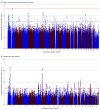The Genetic Architecture of Depression in Individuals of East Asian Ancestry: A Genome-Wide Association Study
- PMID: 34586374
- PMCID: PMC8482304
- DOI: 10.1001/jamapsychiatry.2021.2099
The Genetic Architecture of Depression in Individuals of East Asian Ancestry: A Genome-Wide Association Study
Abstract
Importance: Most previous genome-wide association studies (GWAS) of depression have used data from individuals of European descent. This limits the understanding of the underlying biology of depression and raises questions about the transferability of findings between populations.
Objective: To investigate the genetics of depression among individuals of East Asian and European descent living in different geographic locations, and with different outcome definitions for depression.
Design, setting, and participants: Genome-wide association analyses followed by meta-analysis, which included data from 9 cohort and case-control data sets comprising individuals with depression and control individuals of East Asian descent. This study was conducted between January 2019 and May 2021.
Exposures: Associations of genetic variants with depression risk were assessed using generalized linear mixed models and logistic regression. The results were combined across studies using fixed-effects meta-analyses. These were subsequently also meta-analyzed with the largest published GWAS for depression among individuals of European descent. Additional meta-analyses were carried out separately by outcome definition (clinical depression vs symptom-based depression) and region (East Asian countries vs Western countries) for East Asian ancestry cohorts.
Main outcomes and measures: Depression status was defined based on health records and self-report questionnaires.
Results: There were a total of 194 548 study participants (approximate mean age, 51.3 years; 62.8% women). Participants included 15 771 individuals with depression and 178 777 control individuals of East Asian descent. Five novel associations were identified, including 1 in the meta-analysis for broad depression among those of East Asian descent: rs4656484 (β = -0.018, SE = 0.003, P = 4.43x10-8) at 1q24.1. Another locus at 7p21.2 was associated in a meta-analysis restricted to geographically East Asian studies (β = 0.028, SE = 0.005, P = 6.48x10-9 for rs10240457). The lead variants of these 2 novel loci were not associated with depression risk in European ancestry cohorts (β = -0.003, SE = 0.005, P = .53 for rs4656484 and β = -0.005, SE = 0.004, P = .28 for rs10240457). Only 11% of depression loci previously identified in individuals of European descent reached nominal significance levels in the individuals of East Asian descent. The transancestry genetic correlation between cohorts of East Asian and European descent for clinical depression was r = 0.413 (SE = 0.159). Clinical depression risk was negatively genetically correlated with body mass index in individuals of East Asian descent (r = -0.212, SE = 0.084), contrary to findings for individuals of European descent.
Conclusions and relevance: These results support caution against generalizing findings about depression risk factors across populations and highlight the need to increase the ancestral and geographic diversity of samples with consistent phenotyping.
Conflict of interest statement
Figures



References
-
- GBD 2017 Disease and Injury Incidence and Prevalence Collaborators . Global, regional, and national incidence, prevalence, and years lived with disability for 354 diseases and injuries for 195 countries and territories, 1990-2017: a systematic analysis for the Global Burden of Disease Study 2017. Lancet. 2018;392(10159):1789-1858. doi:10.1016/S0140-6736(18)32279-7 - DOI - PMC - PubMed
-
- World Health Organization. Depression and other common mental disorders global health estimates. Accessed October 20, 2019. https://apps.who.int/iris/bitstream/handle/10665/254610/WHO-MSD-MER-2017...
Publication types
MeSH terms
Grants and funding
- MC_U137686851/MRC_/Medical Research Council/United Kingdom
- 16896/CRUK_/Cancer Research UK/United Kingdom
- MC-PC-13049/MRC_/Medical Research Council/United Kingdom
- R01 HL142302/HL/NHLBI NIH HHS/United States
- MC_UU_12026/2/MRC_/Medical Research Council/United Kingdom
- MR/S035818/1/MRC_/Medical Research Council/United Kingdom
- 212360/Z/18/Z/WT_/Wellcome Trust/United Kingdom
- MC_PC_14135/MRC_/Medical Research Council/United Kingdom
- MR/N015746/1/MRC_/Medical Research Council/United Kingdom
- 216767/Z/19/Z/WT_/Wellcome Trust/United Kingdom
- R01 MH125938/MH/NIMH NIH HHS/United States
- 104085/Z/14/Z/WT_/Wellcome Trust/United Kingdom
- U01 MH087981/MH/NIMH NIH HHS/United States
- 212946/Z/18/Z/WT_/Wellcome Trust/United Kingdom
- R01 MH101459/MH/NIMH NIH HHS/United States
- 104036/Z/14/Z/WT_/Wellcome Trust/United Kingdom
- BHF_/British Heart Foundation/United Kingdom
- WT089269/Z/09/Z/WT_/Wellcome Trust/United Kingdom
- BB/R01356X/1/BB_/Biotechnology and Biological Sciences Research Council/United Kingdom
- 202922/Z/16/Z/WT_/Wellcome Trust/United Kingdom
- MC-PC-14135/MRC_/Medical Research Council/United Kingdom
- WT090532/Z/09/Z/WT_/Wellcome Trust/United Kingdom
- MC_UU_00017/1/MRC_/Medical Research Council/United Kingdom
- L30 MH104939/MH/NIMH NIH HHS/United States
- R01 DK107786/DK/NIDDK NIH HHS/United States
- 088158/Z/09/Z/WT_/Wellcome Trust/United Kingdom
- K01 MH113848/MH/NIMH NIH HHS/United States
- MC_PC_17209/MRC_/Medical Research Council/United Kingdom
- WT083573/Z/07/Z/WT_/Wellcome Trust/United Kingdom
- R01 MH113930/MH/NIMH NIH HHS/United States
- R01 DK110113/DK/NIDDK NIH HHS/United States
- MC_PC_13049/MRC_/Medical Research Council/United Kingdom
LinkOut - more resources
Full Text Sources
Other Literature Sources
Medical

